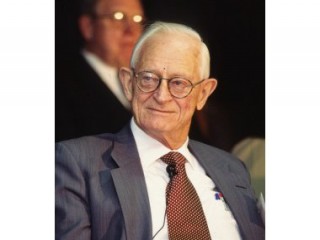
Alan G. MacDiarmid biography
Date of birth : 1927-04-14
Date of death : 2007-02-07
Birthplace : Masterton, New Zealand
Nationality : New Zealand-American
Category : Science and Technology
Last modified : 2011-09-16
Credited as : physicist, Nobel Prize for Chemistry,
1 votes so far
MacDiarmid worked in the School of Chemistry at the University of St Andrews in Scotland for a year as a member of the junior faculty. He then took a faculty position in chemistry at the University of Pennsylvania, where he became a full Professor in 1964. MacDiarmid spent the greater part of his career on the chemistry faculty of the University of Pennsylvania, where he taught for 45 years. The first twenty years of his research there focused on silicon chemistry. He was named Blanchard Professor of Chemistry in 1988.
The "eureka" moment of this discovery was actually MacDiarmid's idea, as he added bromide to a precursor of polysulfurnitride, because in previous experiments bromide had increased conductivity of other materials by tenfold. To the astonishment of all three scientists, however, adding bromide increased the conductivity of their latest mixture not by tenfold but by many millions of times. MacDiarmid, Heeger, and Shirakawa were jointly awarded the Nobel Prize for Chemistry in 2000. MacDiarmid's father was a friend of another Nobel laureate, Ernest Rutherford.
Awards:
Fulbright 1950
Frederic Stanley Kipping Award in Silicon Chemistry 1971
Nobel Prize for Chemistry 2000 (with Alan J. Heeger and Hideki Shirakawa)
RSNZ Rutherford Medal 2000
Order of New Zealand 2001
Alpha Chi Sigma Chemistry Fraternity
New Zealand Ancestry
Naturalized US Citizen
















